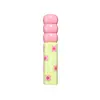What's inside
What's inside
 Key Ingredients
Key Ingredients

 Benefits
Benefits

 Concerns
Concerns

 Ingredients Side-by-side
Ingredients Side-by-side

Water
Skin ConditioningBis-Diglyceryl Polyacyladipate-2
EmollientDiisostearyl Malate
EmollientDiphenyl Dimethicone
EmollientOctyldodecanol
EmollientGlycerin
HumectantCetyl PEG/PPG-10/1 Dimethicone
EmulsifyingDipropylene Glycol
HumectantEthylcellulose
Sorbitan Isostearate
EmulsifyingPentylene Glycol
Skin ConditioningHydroxyethyl Acrylate/Sodium Acryloyldimethyl Taurate Copolymer
Emulsion StabilisingSqualane
EmollientCeteareth-20
CleansingSodium Stearoyl Glutamate
CleansingAlcohol Denat.
AntimicrobialTitanium Dioxide
Cosmetic ColorantPhenoxyethanol
PreservativePolysorbate 60
EmulsifyingParfum
MaskingGlyceryl Caprylate
EmollientCI 15985
Cosmetic ColorantAcid Red 33
CI 19140
Cosmetic ColorantEthylhexylglycerin
Skin ConditioningCI 45410
Cosmetic ColorantAluminum Hydroxide
EmollientAmmonium Polyacrylate
StabilisingButylene Glycol
HumectantPentaerythrityl Tetra-Di-T-Butyl Hydroxyhydrocinnamate
AntioxidantWater, Bis-Diglyceryl Polyacyladipate-2, Diisostearyl Malate, Diphenyl Dimethicone, Octyldodecanol, Glycerin, Cetyl PEG/PPG-10/1 Dimethicone, Dipropylene Glycol, Ethylcellulose, Sorbitan Isostearate, Pentylene Glycol, Hydroxyethyl Acrylate/Sodium Acryloyldimethyl Taurate Copolymer, Squalane, Ceteareth-20, Sodium Stearoyl Glutamate, Alcohol Denat., Titanium Dioxide, Phenoxyethanol, Polysorbate 60, Parfum, Glyceryl Caprylate, CI 15985, Acid Red 33, CI 19140, Ethylhexylglycerin, CI 45410, Aluminum Hydroxide, Ammonium Polyacrylate, Butylene Glycol, Pentaerythrityl Tetra-Di-T-Butyl Hydroxyhydrocinnamate
Ricinus Communis Seed Oil
MaskingEuphorbia Cerifera Cera
AstringentSimmondsia Chinensis Seed Oil
EmollientLimnanthes Alba Seed Oil
Skin ConditioningOctyldodecanol
EmollientCetyl Lactate
EmollientSucrose Hexaisostearate
EmollientDiisostearyl Malate
EmollientGlycol Distearate
EmollientOrange Roughy Oil
Skin ConditioningParaffin
PerfumingOlea Europaea Fruit Oil
MaskingTocotrienols
Skin ConditioningSqualene
EmollientBeeswax
Emulsion StabilisingLanolin
EmollientTocopherol
AntioxidantPlacental Extract
Ascorbyl Tetraisopalmitate
AntioxidantIsostearoyl Hydrolyzed Collagen
CleansingPalmitoyl Tripeptide-1
Skin ConditioningPortulaca Grandiflora Extract
Skin ConditioningPalmitoyl Tripeptide-38
Skin ConditioningSucrose Cocoate
EmulsifyingHydrogenated Palm Oil
EmollientLanolin Acid
CleansingHema Trimellitate Anhydride
Triethylamine
Emulsion StabilisingIsostearic Acid
CleansingEthyl Stearate
EmollientSorbitan Isostearate
EmulsifyingStearic Acid
CleansingPalmitic Acid
EmollientTribehenin
EmollientPhenoxyethanol
PreservativeTitanium Dioxide
Cosmetic ColorantCI 45380
Cosmetic ColorantCI 15985
Cosmetic ColorantBlue 1 Lake
Cosmetic ColorantRicinus Communis Seed Oil, Euphorbia Cerifera Cera, Simmondsia Chinensis Seed Oil, Limnanthes Alba Seed Oil, Octyldodecanol, Cetyl Lactate, Sucrose Hexaisostearate, Diisostearyl Malate, Glycol Distearate, Orange Roughy Oil, Paraffin, Olea Europaea Fruit Oil, Tocotrienols, Squalene, Beeswax, Lanolin, Tocopherol, Placental Extract, Ascorbyl Tetraisopalmitate, Isostearoyl Hydrolyzed Collagen, Palmitoyl Tripeptide-1, Portulaca Grandiflora Extract, Palmitoyl Tripeptide-38, Sucrose Cocoate, Hydrogenated Palm Oil, Lanolin Acid, Hema Trimellitate Anhydride, Triethylamine, Isostearic Acid, Ethyl Stearate, Sorbitan Isostearate, Stearic Acid, Palmitic Acid, Tribehenin, Phenoxyethanol, Titanium Dioxide, CI 45380, CI 15985, Blue 1 Lake
 Reviews
Reviews

Alternatives
Ingredients Explained
These ingredients are found in both products.
Ingredients higher up in an ingredient list are typically present in a larger amount.
Ci 15985 is a dye made from petroleum. It is synthetically created and approved by the FDA for use in foods and cosmetics.
The color of this dye is orange/yellow.
This ingredient can be found in makeup, sun care, and skincare.
Learn more about CI 15985Diisostearyl Malate is an emollient and most often used in lip products. It comes from isostearyl alcohol, a fatty acid, and malic acid, an AHA.
As an emollient, Diisostearyl Malate helps create a thin film on your skin to trap moisture in. This helps keep your skin soft and smooth.
Octyldodecanol is a fatty alcohol. It is primarily used to enhance the texture of products.
As an emulsifier, Octyldodecanol helps prevent the oils and waters from separating. It also prevents ingredients from creating foam when shaken.
Octyldodecanol is created by reducing fatty acid to an alcohol.
Due to its high molecular weight, it does not get absorbed into the skin.
Learn more about OctyldodecanolPhenoxyethanol is a preservative that has germicide, antimicrobial, and aromatic properties. Studies show that phenoxyethanol can prevent microbial growth. By itself, it has a scent that is similar to that of a rose.
It's often used in formulations along with Caprylyl Glycol to preserve the shelf life of products.
Sorbitan Isostearate is an emulsifer and cleaning agent. It is created from isostearic acid and sorbitol.
As an emulsifier, Sorbitan Isostearate prevents oils and water from separating.
Due to its isostearic acid base, it may not be safe for Malassezia or fungal acne.
Learn more about Sorbitan IsostearateTitanium dioxide is a mineral UV filter widely used in sunscreens and cosmetics.
It is one of only two UV filters officially classified as “mineral” by regulatory agencies, the other being zinc oxide.
Titanium dioxide provides broad-spectrum protection mostly in the UVB and UVAII range, with some protection in the UVAI range.
While its UVA protection isn’t as strong as zinc oxide’s, the difference is minor.
A common myth is that mineral UV filters reflect UV light. However, modern research shows titanium dioxide absorbs UV radiation like chemical filters (~95% absorption & 5% reflection).
Thanks to its non-irritating nature, titanium dioxide is suitable for sensitive, acne-prone, or redness-prone skin. It is unlikely to cause "eye sting" like other sunscreen ingredients.
A major drawback of this ingredient is its white cast and thick texture. This is why mineral sunscreens often leave a white cast and are less cosmetically elegant than chemical/hybrid sunscreens.
To improve white cast and spreadability, micronized or nano-sized titanium dioxide is often used.
There are ongoing concerns surrounding nano-titanium oxide's impact on marine ecosystems.
There is no conclusive evidence that any form of titanium oxide (or any other sunscreen ingredients) will cause harm to marine ecosystems or coral reefs. The science is still developing but many consumers are keeping a close eye on this issue.
Please note, many destinations have reef-safety sunscreen rules. For instance, the U.S. Virgin Islands advises all visitors to use non-nano mineral sunscreens.
Nano mineral sunscreens once raised safety concerns about absorption into skin.
Extensive research has shown that they do not penetrate healthy or damaged skin; they remain safely on the surface and the top layer of dead skin (stratum corneum).
You'll likely find titanium dioxide bundled with alumina, silica, or dimethicone. These ingredients help make titanium dioxide highly photostable; this prevents it from interacting with other formula components under UV light.
Learn more about Titanium Dioxide